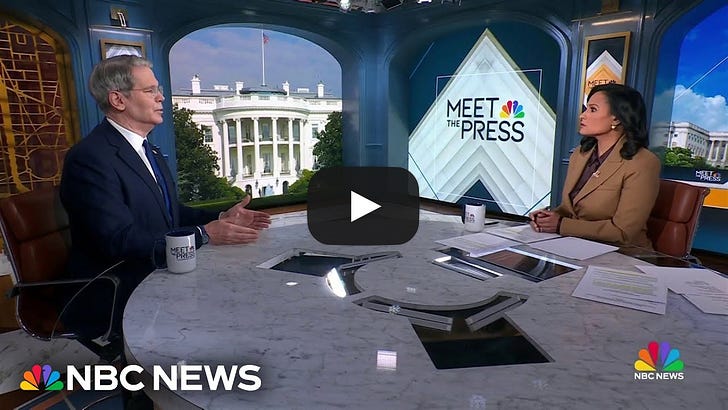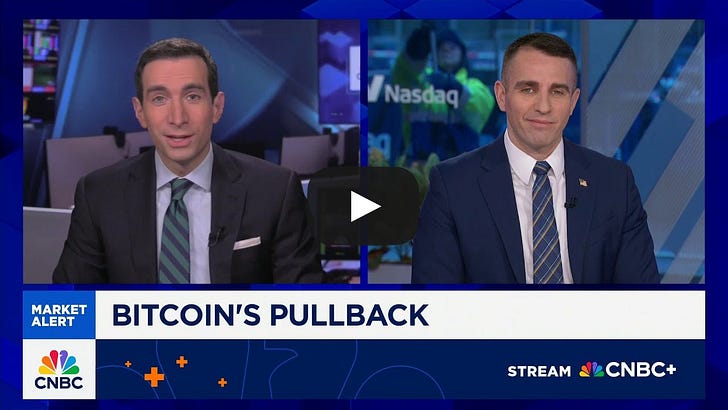|
 |
Chicago Public Schools’ jet-set scandal, the kids can’t read but travel expenses reach $7.7m
Chicago education described as a “$30K-per-kid dumpster fire”
Hello Capitalists,
Here is everything you should be following today:
Chicago Public School travel expenses top $7.7 million
Trips to Vegas, Egypt, Finland and South Africa
Drug company smashes $1T valuation
Second non-tech company in history to achieve the milestone
Bessent pours cold water on Recession fears
Bitcoin withdrawals by ETF’s now number in the billions
Meta busted over concealing reports of harm to users
Bitcoin continues to slide as long dormant account sells
Today’s markets + assets:
✅ DOW: 46459.84 (⬆️ 0.46%)
✅ S&P: 6697.03 (⬆️ 1.42%)
✅ NASDAQ: 22813.15 (⬆️ 2.43%)
⚠️🔴CBOE VIX Volatility Index: 20.97 (⬇️ 10.63%)
✅ Gold: $4089.3 (⬆️ 0.24%)
✅ Silver: $50.195 (⬆️ 0.54%)
✅ Bitcoin: $87,696 (⬆️ 1.27%)
The Capitalist is a reader-supported publication Reject Corporate Left-Wing Journalism
Chicago Public Schools’ jet-set scandal, the kids can’t read but travel expenses are up 2,467%
Chicago Public Schools shelled out $14.5 million on lavish travel—including jaunts to Las Vegas and Egypt—across fiscal years 2023 and 2024, even as just 30.5% of elementary students read at grade level and chronic absenteeism plagues 40% of kids.
Travel Costs Explode Dramatically: Expenses surged 2,467% to $7.7 million in FY 2024 from $300,000 in FY 2021, exceeding pre-pandemic levels with exotic trips to Finland and South Africa.
Student Proficiency Plummets Low: Only 18.3% of grade 3-8 kids are proficient in math; 11th graders fare worse at 22.4% proficient in reading and 18.6% proficient inmath on SATs, amid 40.8% chronic absenteeism.
Leaders Face Fierce Backlash: Pastor Corey Brooks blasts “fallen” leadership for self-serving spending; activist Corey DeAngelis dubs the system a “$30K-per-kid dumpster fire” wasting taxpayer funds.
CPS Vows Tighter Controls:School districts have formed a review committee that intends to curb employee travel, and is rolling out a new financial system to boost transparency and prevent future excesses.
Your Complimentary 90-Day AMAC Membership
America is at a crossroads — and your voice matters. That’s why we’re inviting you to try AMAC — The Association of Mature American Citizens — free for 90 days.
When you activate your complimentary membership, you’ll receive immediate access to:
Exclusive Savings on travel, insurance, healthcare, and more
Trusted Resources on Medicare, retirement, and Social Security
A Voice in Washington through AMAC Action, our powerful grassroots advocacy arm
Community & Fun with the AMAC Magazine, book club, sweepstakes, and more
No cost. No credit card needed. No obligation. Just 90 days of everything AMAC has to offer — so you can experience the difference for yourself.
[Activate Your Free 90-Day Membership]
Join today and stand with millions of like-minded Americans fighting to protect faith, family, and freedom.
P.S. You’ll also start receiving AMAC Magazine, the trusted publication conservatives rely on for news and insight you won’t find anywhere else.
Eli Lilly smashes $1Trillion valuation on the back of weight loss drugs
Eli Lilly and Co. soared to a historic $1 trillion market value Friday—the first for any health-care firm—fueled by blockbuster sales of its weight-loss and diabetes drugs Mounjaro and Zepbound, catapulting the 148-year-old pharma giant into elite company long held solely by tech titans.
Historic Pharma Milestone Achieved: Founded in 1876, Eli Lilly becomes the second non-tech U.S. company after Berkshire Hathaway to hit $1 trillion, surpassing rivals in the booming GLP-1 drug arena.
Explosive Drug Revenue Surge: Mounjaro raked in $6.52 billion in Q3 sales, up 109% year-over-year, while Zepbound exploded 184% to $3.59 billion, propelling 2024 totals to $16.47 billion combined.
Tirzepatide’s Dual-Hormone Edge: The active ingredient mimics both GLP-1 and GIP hormones for superior appetite suppression and metabolic benefits, outpacing Novo Nordisk’s single-target semaglutide in Ozempic and Wegovy.
Oral Innovation Looms Large: A pill version of the drugs launches next year, easing production and access amid projections for a $150 billion-plus weight-loss market by early 2030s.
Bessent sees no recession in 2026 as Trumps Big Beautiful Bill kicks in
Treasury Secretary Scott Bessent boldly predicted Sunday no U.S. recession in 2026, crediting President Donald Trump’s trade and tax policies for setting the stage for robust, noninflationary growth amid lingering inflation pressures from services and challenged housing sectors.
Treasury Chief’s Optimism: Bessent, in an NBC “Meet the Press” interview, declared “very, very optimistic” outlook for 2026, with Trump’s policies poised to deliver widespread American benefits soon.

Sectoral Strains Persist: Housing and interest-rate-sensitive industries face ongoing hurdles, while services fuel inflation, though falling energy prices should soon ease overall costs.
Tax Cuts Propel Growth: The GOP’s “One Big, Beautiful Bill Act” permanently extends 2017 tax cuts, adds senior “bonuses,” tip/overtime tax relief, and auto loan breaks to ignite stronger economic expansion.
Healthcare Costs Loom: Affordable care subsidies stalled by congressional gridlock will hike premiums for millions, but Trump administration vows imminent reforms to slash health expenses.
Bitcoin’s dismal November continues as $3.5 Billion is pulled by investors
US-listed Bitcoin exchange-traded funds are barreling toward their worst month ever, with investors yanking $3.5 billion in November amid a brutal price plunge that has erased 8% of the cryptocurrency’s value year-to-date.
Massive ETF Outflows Surge: BlackRock’s flagship IBIT fund alone hemorrhaged $2.2 billion, representing 60% of total Bitcoin ETF assets and nearing the cohort’s all-time monthly record from February.

Feedback Loop Accelerates Drop: Citi Research reveals every $1 billion in ETF redemptions triggers a 3.4% Bitcoin price plunge, turning sentiment into a vicious self-reinforcing spiral.
Hedge Funds Unwind Strategies: Traders are dumping holdings to exit basis trades which traditionally exploit spot-future gaps and capitalize on volatility, this is in addition to traders hedge bets in derivatives shorts against Bitcoin, further fueling the November rout.
Bearish Year-End Forecast: Analysts warn of further downside with Citi’s $82,000 bear-case target, as exhausted early-year euphoria collides with rising market volatility and gold’s allure.
Meta concealed a 2019 report that its platform caused harm to users
In a bombshell court filing unsealed Friday, Meta allegedly buried a 2019 internal research showing users felt less depressed and anxious after ditching Facebook, fueling lawsuits accusing the tech giant of deceiving Congress and endangering children’s mental health.
Project Mercury Launched: Meta’s 2019 study randomly deactivated Facebook and Instagram for users. This revealed declines in users feelings of depression, anxiety, loneliness, and social comparison after just one week off the platforms.
Research Abruptly Halted: Company insiders feared backlash akin to tobacco firms concealing dangers were the results made public, prompting Meta to scrap the full month-long probe and withhold results from public or congressional scrutiny.
Lawsuit Alleges Deception: Plaintiffs, including parents and states, claim Meta misled lawmakers about known harms to youth, joining broader suits against TikTok, Snap, and YouTube for prioritizing profits over child safety.
Meta Fiercely Denies Claims: Spokesperson Andy Stone blasts the filing as “cherry-picked” distortions, touting teen protections like parental controls while dismissing study flaws as intuitive self-selection bias.
Trump’s childhood home in Queens hits the market
In Queens’ posh Jamaica Estates, Donald Trump’s boyhood Tudor mansion—built by his father in 1940 and once overrun by feral cats—has reemerged as a $2.3 million smart-home gem after a $500,000 gut renovation, luring buyers with presidential pedigree.
Historic Tudor Revival Unveiled: Five-bedroom brick-and-stucco residence, spanning 2,500 square feet across four levels, restores 1940s elegance with an original wood stove and a new sunroom for modern luxury living.
Feral Fiasco to Smart Sanctuary: From 2019’s disrepair—lacking water, power, and cat-free zones—to February’s $835,000 rescue, the eight-month overhaul adds high-tech perks like smart toilets and door locks.
Election Night Price Spikes: Previously flipped for $1.39 million on 2016 Election Night and $2.14 million on 2017 Inauguration Day, the house now tests Queens’ $1.5 million median house price.
Developer’s Legacy Bet Pays Off: Tommy Lin’s vision banks on Trump’s early-years aura to attract deep-pocketed fans, after transforming an unlivable relic into coveted enclave trophy.
The Capitalist is a reader-supported publication Reject Corporate Left Wing Journalism
You're currently a free subscriber to The Capitalist. For the full experience, upgrade your subscription.




